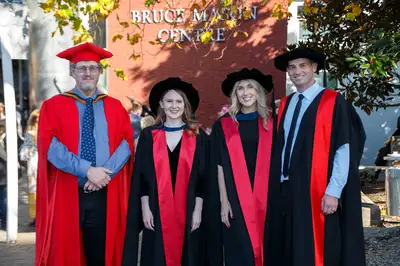
Dr Emily Cory.
It was through volunteering with Youthline and delving into one of her initial papers at Te Kunenga ki Pūrehuroa Massey University that helped Dr Cory learn about the prevalence of NSSI in New Zealand and around the world. She says this led her to want to contribute to the knowledge around NSSI.
“While I have not had first-hand experience with NSSI, I have had some first-hand experience with perfectionism, which is a topic that I was interested in. After reading more on the topic and speaking with my supervisors, I decided to examine the relationship between perfectionism and NSSI to not only provide further understanding but ultimately to contribute to improved clinical interventions.”
Dr Cory’s research used a two-stage data collection and analysis approach which saw participants aged 18 to 35 initially complete an online, self-report questionnaire. This measured their engagement in NSSI, relative levels of perfectionism and relative levels of thwarted belongingness (feelings of loneliness and a lack of reciprocal care) and perceived burdensomeness (feelings of self-hatred and perceiving oneself as a liability). The second stage involved a smaller subset of participants with a history of NSSI and experiences of perfectionism, who took part in semi-structured interviews with Dr Cory to discuss these experiences.
Overall, Dr Cory says her study found a positive relationship between perfectionism and NSSI.
“The statistical analyses supported overall perfectionism, perfectionistic strivings and perfectionistic concerns all positively related to NSSI. Thwarted belongingness and perceived burdensomeness were found to also be positively related to NSSI. This effect was demonstrated both quantitatively, through statistically significant results across multiple analyses, and qualitatively using thematic analysis. My hope for my research findings is they will contribute to assisting young adults in managing the difficulties that come from having high levels of perfectionism and engaging in NSSI, especially when perceiving themselves as a burden.”
While she enjoyed many parts of completing her thesis, Dr Cory says she found the interviews with participants to be the most significant.
“I think this speaks to why I went into this profession in the first place. All the people who participated in my research were so generous with their time and honesty. I will always be thankful to those individuals who trusted me with their stories. It allowed for the discussion of lived experiences of those who are perfectionistic and engaging in NSSI, which has been underrepresented in the literature thus far.”
Dr Cory says her findings will better inform clinicians as to who may be at higher risk of developing difficulties with NSSI and encourage preventative tools to assist individuals most at risk.
“Many of the participants described a strong link between not meeting their expectations and subsequently engaging in NSSI, highlighting the potential importance of perfectionism-focused treatment to decrease engagement in NSSI. The individuality of each participant’s experience was a key finding as it reinforces the importance of a thorough assessment, case formulation and targeted intervention to be able to effectively support and treat clients. Establishing how the client interprets NSSI is significant in helping them develop their own narrative and utilise this in an effective way to maintain and improve their wellbeing going forward.”
The 29-year-old, who moved from England to Auckland when she was six, says she’s been interested in a career in health for a long time.
“I first considered going into psychology when I was around 13. Once I took my first psychology paper at university, it confirmed my interest. I completed a Bachelor of Science (Honours) at the University of Auckland and then applied to many universities around New Zealand, as there are limited spaces in the Doctor of Clinical Psychology programme. I was thrilled to be offered a place at Massey because of its great reputation training clinical psychologists. The location also allowed me to stay close to my friends and family. I remember the relief and excitement of starting at Massey as if it was yesterday!”
Dr Cory now works as a Clinical Psychologist at the Kari Centre – Child and Adolescent Mental Health Service, Te Toka Tumai, Te Whatu Ora. She says her research has been very relevant and she was glad to have the knowledge going into the clinical role.
While completing a thesis is a journey of ups and downs according to Dr Cory, she says the reward at the end is worth it.
“Having supportive people around you to lean on and making deliberate time for areas in your life outside of your thesis definitely helps. I owe thanks to so many including my husband, my parents, family and friends, colleagues and all the participants that made my research possible. I’d like to especially thank my supervisors Dr Matt Williams and Dr Clifford van Ommen for their invaluable guidance and support. I would also like to thank Dr John Fitzgerald who supported the first half of my thesis journey. Thank you also to Massey for providing me with the Vice Chancellor’s Doctoral Scholarship.”

Left to right: Dr Clifford van Ommen, Dr Emily Cory, Dr Shoni Marshall-Edwards and Dr Matt Williams.
Related news
Uncovering the secret life of blackbirds
Dr Mehrnaz Tavasoli dedicated her PhD study to broadening the understanding of how individuality in behavioural traits contributes to reproductive success and survival in common blackbirds.

Saving endangered bird species a passion for PhD graduate
For his doctoral research, Dr Enzo Reyes investigated the factors that need to be considered to successfully translocate the endangered Floreana mockingbird to Floreana Island in the Galápagos Archipelago.
